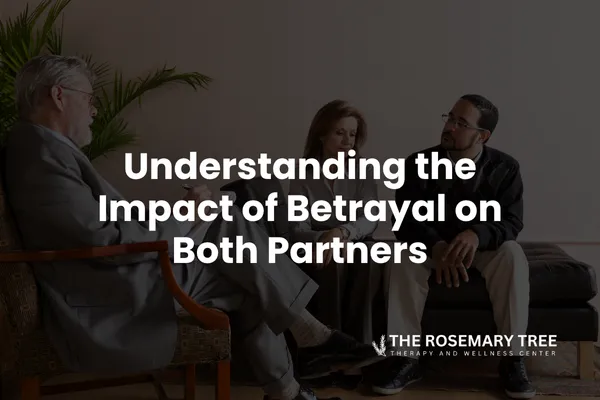
Understanding the Impact of Betrayal on Both Partners
When Betrayal Breaks the Balance
When betrayal comes to light, it does not only affect the betrayed partner. It shifts the ground beneath both people. One is overwhelmed by pain and shock. The other may be buried in guilt, fear, or shame.
Each person is reacting to trauma, even though the experiences are not the same. Understanding this difference is the first step toward healing together instead of against each other.
The Betrayed Partner’s Experience
For the betrayed partner, the discovery of infidelity or deceit feels like an earthquake. Everything once trusted suddenly feels unsafe. This trauma reaches far beyond anger, it impacts the nervous system, sleep, and sense of self.
Common reactions include:
Intense emotional swings between rage, grief, and numbness
Intrusive thoughts or images that are hard to stop
Difficulty concentrating or functioning at work or home
A constant need for reassurance or truth
Loss of self-worth or fear of being “not enough”
These are not signs of weakness. They are natural trauma responses to an experience that shattered trust and safety.
The Partner Who Caused the Harm
The partner who acted outside the relationship may experience their own form of trauma, one rooted in guilt, fear, and confusion.
Common experiences include:
Intense shame or self-loathing
Fear of losing the relationship or family
Feeling frozen or unsure how to respond without making things worse
Pressure to “fix” things immediately
Avoidance, denial, or emotional shutdown due to guilt
This partner often wants to repair the damage but feels lost in how to do so. Their efforts may come across as defensive or rushed, which can increase the betrayed partner’s pain.
Two Traumas, One Relationship
When both people are hurting, it is easy to become trapped in a cycle of reaction, one seeking reassurance, the other withdrawing or over-explaining. Neither feels seen or understood.
Recognizing that both partners are experiencing trauma helps shift the focus from blame to healing. It does not excuse the behavior, but it creates space for compassion, accountability, and truth.
Why Empathy Is More Powerful Than Blame
Blame keeps couples stuck in a pattern of defense. Empathy, on the other hand, opens the door to understanding.
Empathy does not mean excusing betrayal. It means recognizing that healing requires both people to feel safe enough to speak honestly about their pain. Without empathy, neither partner can access the vulnerability needed to move forward.
Empathy sounds like:
“I can see how much this has hurt you.”
“I know I caused pain, and I want to understand it.”
“I feel scared too, but I’m willing to stay in this conversation.”
These small phrases can begin to soften years of distance.
The Role of Therapy in Bridging the Gap
Our Accelerated Deep-Work Therapy Intensives provide the structure and guidance couples need to process these emotions safely.
In an intensive, both partners receive time to:
Explore their emotions without interruption or blame
Understand each other’s nervous system reactions
Learn communication tools that prevent re-traumatization
Begin developing shared accountability and empathy
Build a foundation of safety before moving toward forgiveness
When guided by licensed clinicians, the process slows down enough for each person to feel heard and for the truth to become a bridge instead of a wall.
What Shared Healing Begins to Look Like
As empathy grows, the relationship’s tone begins to shift. Instead of blame and defense, couples start to notice:
Calmer, more thoughtful conversations
A willingness to listen before reacting
Compassion replacing assumption
Mutual accountability and shared responsibility
It is not a return to “how things were,” but the beginning of something new, a relationship built on understanding rather than fear.
Final Thoughts
The impact of betrayal touches both hearts, even if in different ways. Healing begins when both partners see that they are on the same side of the pain, not opposite ends of it.
If you are ready to begin bridging that gap, we would love to help. You can reach out to us here, and our team will connect with you to talk through what this process could look like. There is no pressure, only care and a space to begin again.


